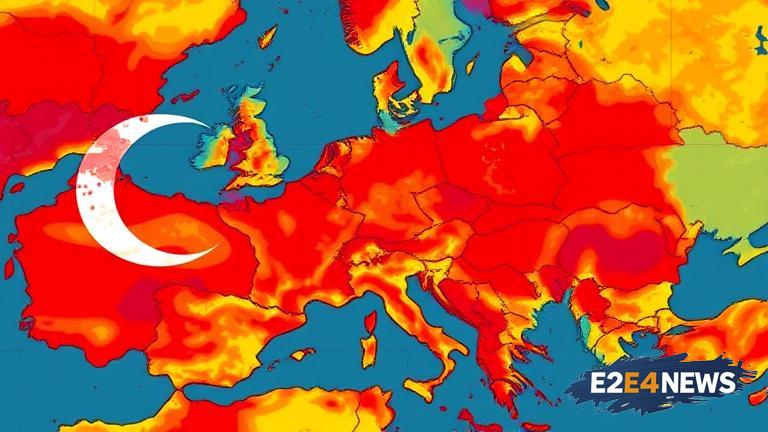A severe heatwave has been sweeping across Europe, bringing with it record-breaking temperatures and unprecedented heat-related challenges. Turkey, in particular, has been experiencing extremely high temperatures, with the country’s weather service announcing a new national record of 50.5 degrees Celsius. This extreme heat has been causing significant disruptions to daily life, with many cities and towns struggling to cope with the soaring temperatures. The heatwave has also raised serious health concerns, with heat-related illnesses and deaths being reported across the continent. In Turkey, the government has been working to mitigate the effects of the heatwave, with measures such as providing cool water and shade for citizens. However, the situation remains dire, with many people, especially the elderly and young children, being advised to stay indoors and avoid exposure to the extreme heat. The heatwave has also had a significant impact on the environment, with wildfires and droughts being reported in several European countries. In addition, the heatwave has been causing significant economic losses, with many businesses and industries being forced to shut down or reduce operations due to the extreme heat. The European Union has been working to provide support and assistance to affected countries, with measures such as providing emergency funding and deploying teams to help with relief efforts. Despite these efforts, the situation remains challenging, with many people struggling to cope with the extreme heat. The heatwave has also raised concerns about the impact of climate change, with many experts warning that such extreme weather events will become more frequent and intense in the coming years. In response, many European countries have been working to reduce their carbon emissions and transition to renewable energy sources. However, more needs to be done to address the root causes of climate change and mitigate its effects. The heatwave has also highlighted the need for better preparedness and emergency planning, with many countries being caught off guard by the severity of the heatwave. In the coming days and weeks, it is essential that European countries work together to provide support and assistance to affected areas and take steps to reduce the impact of the heatwave. This includes providing cool water and shade, as well as implementing measures to reduce the spread of heat-related illnesses. Furthermore, it is crucial that governments and international organizations work together to address the root causes of climate change and develop strategies to mitigate its effects. The heatwave has also had a significant impact on agriculture, with many crops being damaged or destroyed due to the extreme heat. This has raised concerns about food security and the potential for shortages and price increases. In addition, the heatwave has been causing significant disruptions to transportation, with many roads and highways being closed due to the extreme heat. The situation is being closely monitored by authorities, with many countries working to restore normalcy as soon as possible. Overall, the heatwave has been a wake-up call for European countries, highlighting the need for better preparedness and emergency planning, as well as the importance of addressing the root causes of climate change. As the situation continues to unfold, it is essential that governments, international organizations, and individuals work together to provide support and assistance to affected areas and take steps to reduce the impact of the heatwave.
